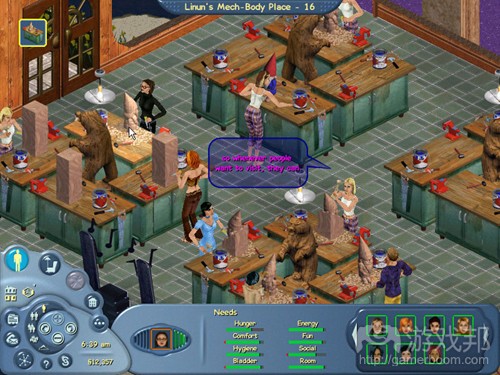分析虚拟世界走向没落的5个原因
作者:Simon Newstead
最近,我一直在设计新游戏,这让我回想到虚拟世界。
记得虚拟世界还是世纪发明的那个时候吗?
我们当中无数人体验了虚拟世界。Gartner预测80%的网络用户有自己的“第二人生”化身。风险投资大量进入虚拟世界开发领域。甚至谷歌也想分一杯羹。
我的新工作室也是。我们利用Unity技术制作了第一个网页3D UGC(用户生成内容)世界。用户可以在里面聊天、创作、购物等。
但若干年后当我们的用户人数达到60万时,我们却决定把工作重心转向手机游戏。
以下是虚拟世界走向衰落的5个原因:
1、无目的
虚拟世界没有明确的目标。
决有任务。没有机制。没有需要解决的问题。虚拟世界不是游戏。
给一张白纸让人玩,有些人可能会兴奋地开始写诗或画画。但大部分人会觉得无聊,最终放弃。
虚拟世界就是这样。
2、无反馈
人类真的很喜欢反馈。
我们的上瘾行为主要就是因为严密的刺激和反应循环。我们经常查看Facebook是希望看到新信息或通告。我们吃垃圾食品是因为它们能刺激多巴胺分泌使我们获得立即的快感。
相反地,你可能在虚拟世界中“忙活”了几个小时都没有收到反馈,因为那些反馈是由其他玩家产生的。刺激性并不强。
3、无主题
大多数成功的UGC社区要么有特定的主题把用户聚集在一起,要么是找到了容易开发受众的途径。
新闻网站Reddit有自己的分类主题。照片网站Pinterest有标签和分类。视频网站Youtube有搜索和推荐功能。
主题使网民之间容易发起和保持交流沟通。
虚拟世界没有提供进入用户喜欢的主题的简单直接的方法,更没有使用户留在虚拟世界中的结构。
4、复杂
强大的技术并不意味着良好的用户体验。
虚拟世界在给用户带来大量自由的同时,也产生了让用户无法继续的复杂度。
现在,能让我们分心的东西太多了,所以我们越来越不能处理太复杂的东西,特别是当第一次尝试某事物时。
5、需求可以在其他地方得到满足
且不说缺陷,虚拟世界确实的许多亮点——如在线社区和创作自由。
但这些需求可以通过其他方式得到满足。
说到与好友互动,我可以在《Hay Day》中建农场,我可以用《Draw Something 2》中涂鸦,这些都是简单又有意义的方法。
在《我的世界》的少量关键机制作用下,玩家可以尽情发挥创造力,培养玩家社区。
从更深刻的角度说,MMO如《Entropia》给玩家提供极大的自由度,它的玩家群体也异常地忠实。
虚拟世界何去何从?
所以,对于我们这些制作手机游戏的人而言,我们应该忘记虚拟世界吗?
我觉得不应该。虽然从来没有实践它的全部潜能,我们仍然可以吸收虚拟世界的优点。
首先是思考如何把创造力融入手机游戏的机制,以便拓展可能性。
这可能是一件相当棘手的任务——从程序上你如何“判断”创造力?如果满足某种功能性目标的创造力,倒是比较容易判断,但有没有什么办法可以判断“美”或“艺术价值”?在我们的第一款游戏中,我们设计了一种判断流行装备的系统。虽然我应该首先承认还可以增加很多细节,但界定和平衡这种系统并不总是那么容易。
如果你可以设计一种使社区公平、抗干扰的系统,那就及时做吧,使核心循环迅速运转起来。
我们还可以通过更多方式增进玩家之间的友情,使之持续数年而不是短短的数天。在虚拟世界中,合作是非常有意义的。在某些手机策略游戏中的公会中,玩家合作进攻是非常有趣的,但在建造或制作类游戏中,这种合作还是比较少见的。
我们可以提供更深刻的自定义功能,不仅允许用户改变外观,还可以改变用户在游戏世界中的人格和与游戏世界的互动方式。聊天和状态信息只是起点,但在不同的情况下(游戏邦注:如用《第二人生》中的脚本,但没有那种复杂度)你可以有其他办法自定义角色或敌人或基地的程序性反应。
并非所有虚拟世界的概念都能很好地转换到手机游戏中,并且在小小的屏幕上使它们与简单的UX相协调也是个难题,但我们可以学习和运用的东西总是有的。(本文为游戏邦/gamerboom.com编译,拒绝任何不保留版权的转载,如需转载请联系:游戏邦)
5 reasons virtual worlds died
by Simon Newstead
Lately I’ve been designing a couple new games and got me thinking back to virtual worlds.
Remember when they were the next big thing?
Millions of us tried them. Gartner predicted 80% of all net users would have Second Life avatars. VCs invested bigtime. Even Google wanted a piece.
My startup too. We launched the first browser 3d UGC world with cool tech we built on Unity. You could chat, create, shop and more.
But after a couple years we’d only gained 600k users so decided to pivot to mobile games.
Here are 5 reasons why virtual worlds never took off and some ideas for how they can live on in new games:
No purpose
Virtual worlds don’t have explicit goals.
No quests. No mechanics. No problems to solve. They aren’t games.
Give people a blank piece of paper and ask them to “have fun!” A few might get excited and start writing a poem or sketch a masterpiece. But most will be annoyed, grow bored and give up.
Same with virtual worlds.
No feedback
Turns out, humans really love feedback.
Our addictive behaviours are mostly shaped by tight stimuli and response schedules. We check Facebook often with the hope of new message or notifications. We eat junk food and are rewarded with an immediate dopamine hit.
Contrast that to virtual worlds where you might “work” for hours before getting feedback, which can only come from other players. Not very motivating.
No theme
Most successful UGC communities have either a particular topic that glues them together, or easy ways to dive to them.
Reddit has subreddits. Pinterest has tags and categories. Youtube has search and recommendations.
Themes make it easy to consume, start and keep up conversations.
In virtual worlds there is no easy way to jump straight into the themes you like, and no structure that enforce adherence to them.
Complexity
Great technology doesn’t mean a great user experience.
Virtual worlds offer great freedom, but also a LOT of complexity and ways to get stuck.
These days where the distractions abound, people don’t handle complexity well, especially when trying something for the first time.
Needs met elsewhere
Despite drawbacks, virtual worlds offered a couple of bright spots – online community and freedom to create.
But the spirit of these can also be met in other ways.
I can build a great farm in Hay Day or doodle in Draw Something 2, interacting with friends in simple but meaningful ways.
Minecraft offers great creativity and community with a small number of important mechanics.
On the deeper end, MMOs like Entropia have great freedom and incredibly loyal community.
So what’s new?
So for those of us creating mobile games, should we forget about virtual worlds?
I don’t think so. Whilst never living up to its hype*, we can continue to incorporate their positives in a deeper way.
First is to figure out how to tie greater creativity into our mechanics to broaden possibility spaces.
This can be really tricky – how do you “judge” creativity in a programmatic manner? Easier if it’s creativity to meet a certain functional goal (ala Bad Piggies), but is there a way to judge “beauty” or “artistic merit”? In our first game we built a system to judge a fashion outfit. Whilst sufficient I’d be first to admit there is a lot more nuance that could be added, though it’s not always easy to define and balance such a system.
If judging is community based how to you build systems to make it fair, tamper proof and not feel like work? And do it in a way that’s timely, and gets the core loop running quickly?
We could also do more to foster friendships between players that last years, not days. Ability to collaboratively work on shared projects is something extremely meaningful in virtual worlds. Guilds in some mobile strategy games let you coordinate attacks which is lots of fun, but haven’t seen much yet in the way of coop base building, or crafting etc.
We can offer a deeper level of customization, allowing you to tweak not only your look but your personality and how you engage in the game world. Chat and status messages are a start, but could you have ways to customise how your characters or army or base react programmatically under different circumstances (like scripting in SL but without the complexity).
Not all virtual world concepts translate well, and getting them working with a simple UX for a small screen is the challenge, but there are things we can learn from and adapt.(source:iteratingfun)








































 闽公网安备35020302001549号
闽公网安备35020302001549号